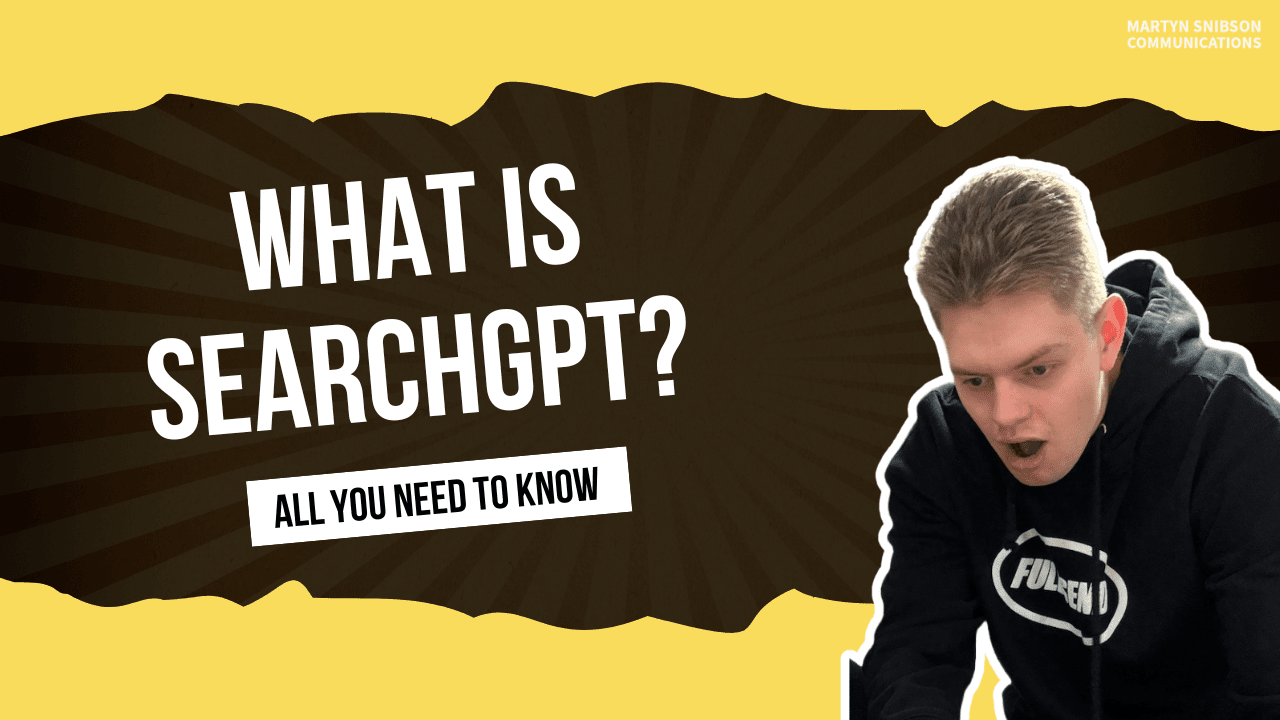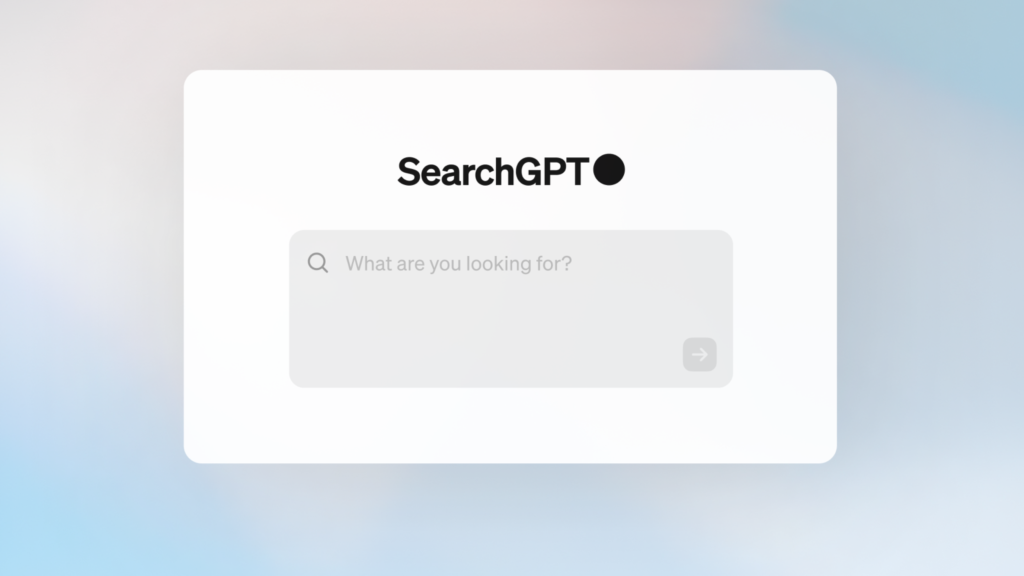Now Reading: What is SearchGPT – All You Need To Know
-
01
What is SearchGPT – All You Need To Know
What is SearchGPT – All You Need To Know

New to the world of generative AI (artificial intelligence)? Or are you just like us (marketers and SEO specialists) who consider AI tools like ChatGPT or Perplexity to be our second-best friend? This guide has all you need to know about OpenAI’s latest instalment, SearchGPT.
It’s no secret that generative AI has been a game-changer in a wide range of industries.
Did you know that 52% of Gen Z users say that they trust generative AI technology to help them make informed decisions? Or that 62% of working professionals are using ChatGPT to assist them with work-related tasks?
The fact is…
Such innovative technology like generative AI and up-and-coming AI-powered search engines like SearchGPT is going to transform how users seek their unique search intents. Not to mention how websites and content can be optimized through SEO to be featured in these AI-generated responses.
So, What is SeachGPT, and how will it impact the SEO industry (Search Engine Optimisation)?
This guide will delve into what SearchGPT is, provide predictions on how it works, and discuss its impacts on Google and search engine optimization (SEO).
Understanding SearchGPT
Let’s get started with the big question. What is SearchGPT, and how does it work (or predict it will work)?
What is SearchGPT
Developed by OpenAI, SearchGPT is a search engine that uses Artificial Intelligence (AI) features to provide users search results based on topic links found online. Unlike traditional search engines, SearchGPT also allows users to ask follow-up questions whilst providing clear and relevant sources to where that information was found.
Some industry experts in SEO, e-commerce and marketing, such as Spencer Hawks and Jarden Bauman, describe the move by OpenAI as a “direct assault on Google.”
Others see it as a producer of higher quality content compared to its direct competitor (Google), ensuring clear attribution and links for publisher sites.
Furthermore, SearchGPT operates similarly to how you would use OpenAI’s ChatGPT – Enter a prompt, and it will generate responses or insights. However, SearchGPT focuses on enhancing search capabilities with fresh, real-time web information with clear citations.
How SearchGPT Works (Supposedly)
At this point in time, SearchGPT is in a temporary prototype stage and will only be available to a small group of users who will be invited by signing up for a waitlist.
It is understood is that SearchGPT combines advanced AI models with real-time web information to provide fast and accurate answers.
OpenAI have stated themselves that SearchGPT results will be “founded on the highest-quality, most reliable information furnished by trust”, and the experience will be like “you[‘re having] a conversation with a person”.
Many SEO experts and AI researchers wonder where SearchGPT would pull answer outputs from and if it will take a page from Google’s book. This was highlighted when Google vetted and included qualified, trusted sources from their knowledge graph. This raises questions about whether website authority and high-quality backlinks will play a role when OpenAI decides where to draw its intelligence from.
In addition to providing real-time web information with citations, SearchGPT also include features like:
- Follow-up Questions: Similar to having a conversation with a human, and unlike Google (at this time), SearchGPT allows users to ask follow-up questions that are relevant and direct to the original query.
- Media Integration: SearchGPT users can access images that are related to their searches.
- Visual Answers: Though it’s unclear if visual answers will be AI-generated or pulled from the net, this feature from OpenAI suggests that user search may feature an AI-generated video that could provide visual summaries or explanations of information. We’ll have to see…
What Does SearchGPT Mean for SEO?
There are mixed reactions from the SEO industry about SearchGPT. On a positive note, the fact that SearchGPT features source attributions could be seen as a win, leading to improved content discovery and awarding sites with good content by opening up new channels for attracting visitors. Industry marketer and business owner Neil Patel, along with other SEO industry leaders, points to the rise of the term “Search Everywhere Optimization.” This alludes to the fact that more people are turning to places beyond Google to find what they need. Like current Search Engine Optimization (SEO), people will find new ways to optimize best practices that cater to each platform, whether it’s SearchGPT, Google, TikTok, or Instagram.
Which answers this follow-up question…
Will the SEO Industry Be Dead Because of SearchGPT?
The answer is no.
Though SearchGPT might disrupt traditional SEO practises, like many Google algorithm updates of the past, the SEO industry will evolve with it. It will be interesting to see how it may make users become overly reliant on AI answers – making users “potentally bypass the rest [of a] sites content”.
At this point in time, only time will tell how SEO professionals will need to adapt their strategies to align with AI-driven search capabilities while continuing to prioritize user intent and engagement.
The End Of Google… (It’s unlikely)
Although many attempts have been made by other search engine companies to take some of Google’s market share, it feels like this time around, SearchGPT offers something that could surpass previous competitors. Another factor on SearchGPT’s side is the amount of resources that its developer, OpenAI, has, with the company on track to making $3.4 billion in annual revenue.
This nowhere competes with Google’s $278.13 billion annual revenue. However, with more and more Google users becoming frustrated with its search engine, now is a great opportunity for some spice in the search engine mix.
And yes
Google will evolve and adapt, particularly when they learn the areas where SearchGPT works well (when released).
Summary
Now that you understand OpenAI’s SearchGPT search engine, how it works (or could), and some key considerations about its impacts on the SEO industry, it’s fair to say that SearchGPT at this time is expected to evolve the SEO landscape rather than eliminate it.
As discussed on my blog, whether it’s the evolution of TikTok SEO or high-quality authentic content (like Lo-Fi), this shift presents a chance for marketers and businesses to innovate their strategies and stay competitive in a changing digital landscape.
Although SearchGPT poses competition to Google, the latter is likely to adapt and evolve in response to the new AI-driven search capabilities, presenting an opportunity for innovation in the search engine market.


























